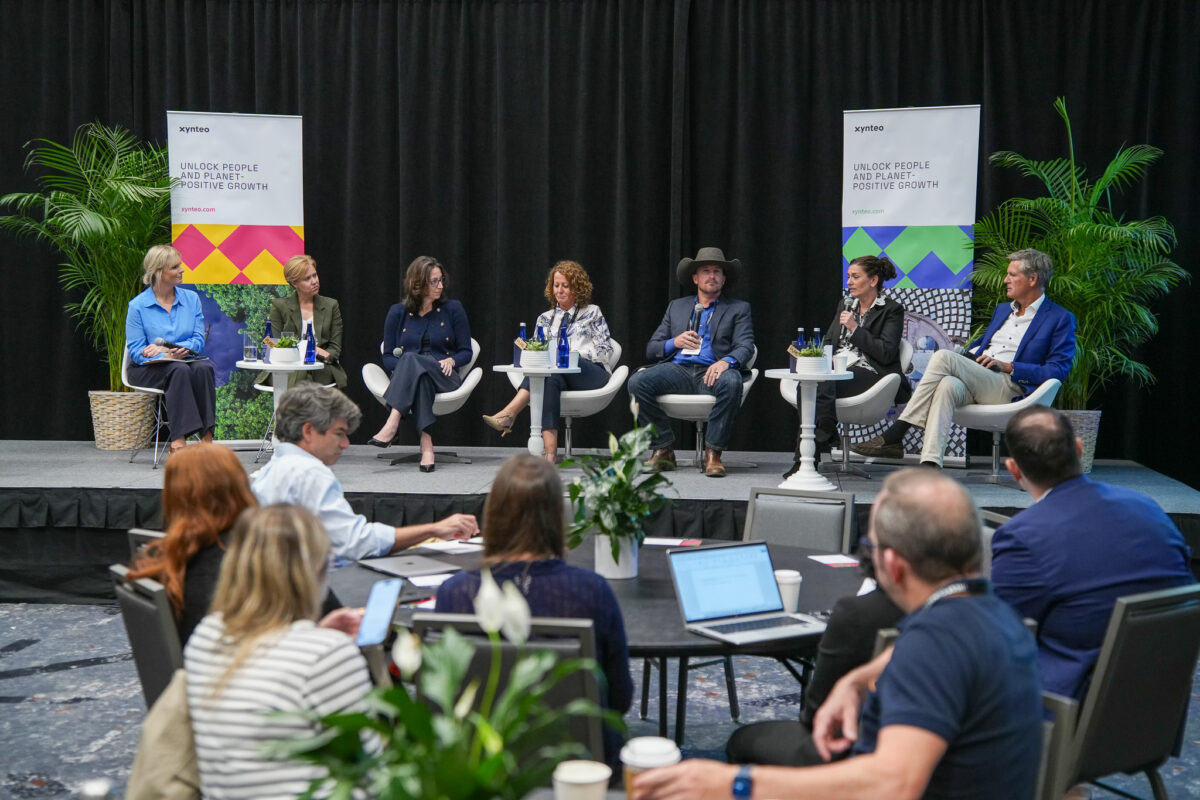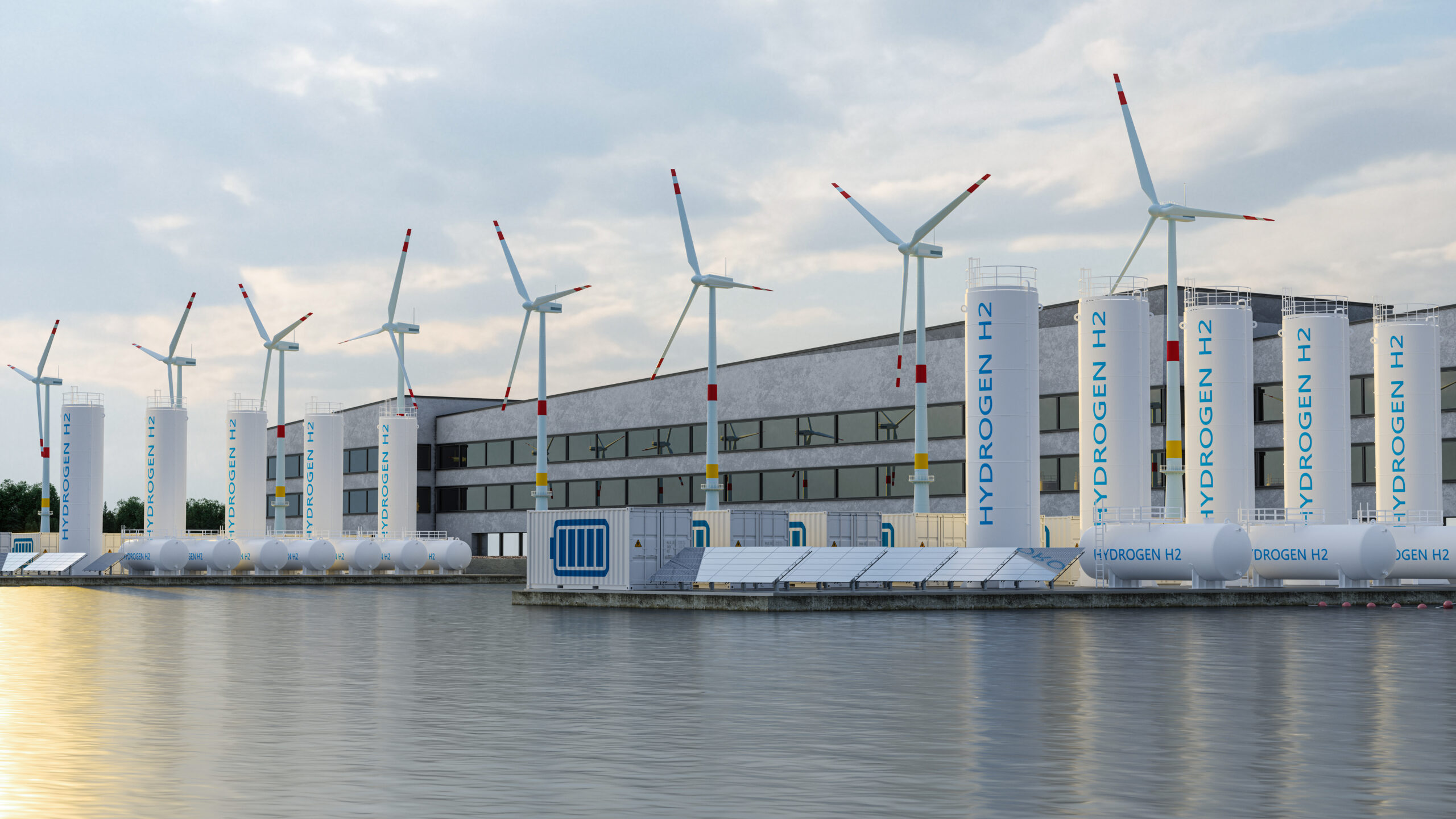As the global population continues to grow, how can we aim to ensure that our food systems not only keep pace, but do so in a way that is environmentally sustainable, resilient, and equitable? With existing food systems already complex, and the transition to sustainable ones even more so, this pressing question took centre stage at Xynteo’s 2024 Climate Week New York panel discussion “Reap What You Sow”.
Agriculture and food production are responsible for around 25% of global greenhouse gas emissions; a reality which necessitates the opportunity for transformative change. Beyond emissions, our food system consumes 70% of the world’s freshwater and can have impacts on biodiversity, reduce soil health, and generate excessive food waste across the lifecycle.
During a wide-ranging discussion, the panel focussed on two critical areas: interventions in sustainable food production and collaborative approaches throughout the value chain. These efforts aim not only to reduce the environmental impact of our food systems but also to facilitate a transition towards more plant-based diets and improved agricultural practices.
The need for resource conservation
Regenerative agriculture centres on restoring soil health, moving away from conventional methods that often degrade it over time. This shift not only leads to improved agricultural productivity but can also enhance biodiversity and increase the nutritional value of crops.
A crucial part of this approach is reducing reliance on synthetic fertilisers to protect soil integrity. However, many farmers remain hesitant to change long-standing practices, often believing that “more fertiliser means better yields.” Engaging farmers in making the transition was highlighted as a key unlock to transforming the system. For example, PepsiCo has been proactive in providing support, offering to compensate farmers who experience short-term yield reductions when they cut back on fertiliser use (and they have yet to see any yield reductions). This type of initiative shows how major industry players can help foster more sustainable farming practices by aligning economic incentives with long-term ecological benefits. Beyond this type of support, the panel noted that additional strategies, such as rethinking fertiliser subsidies, could be instrumental in accelerating the adoption of regenerative methods across the sector.
Mars, Incorporated has also made strides in advancing sustainability through a focus on sustainable land-use management. By investing in practices that promote ecosystem resilience and protect natural resources, Mars is contributing to the broader effort to improve the environmental footprint of agricultural production. These actions are part of a larger strategy to integrate sustainability into the core of land-use planning.
In another approach on the producer side via their direct-to-consumer model, Perennial Pastures is working to promote regionally adapted regenerative farming methods. Their focus on improving land stewardship and enhancing carbon sequestration showcases how regenerative agriculture can, and must, be tailored to local conditions while addressing global sustainability challenges.
Panellists unanimously agreed, despite having differences of opinion on the approach, that the key to progress lies in holistically integrating these initiatives, alongside many others, through comprehensive industry-wide collaboration. Only through this unified approach can we effectively harness the growing recognition that achieving both economic and environmental sustainability requires engagement across and beyond the sector. This collaborative effort is essential to catalysing lasting, transformative change in agriculture and food systems.

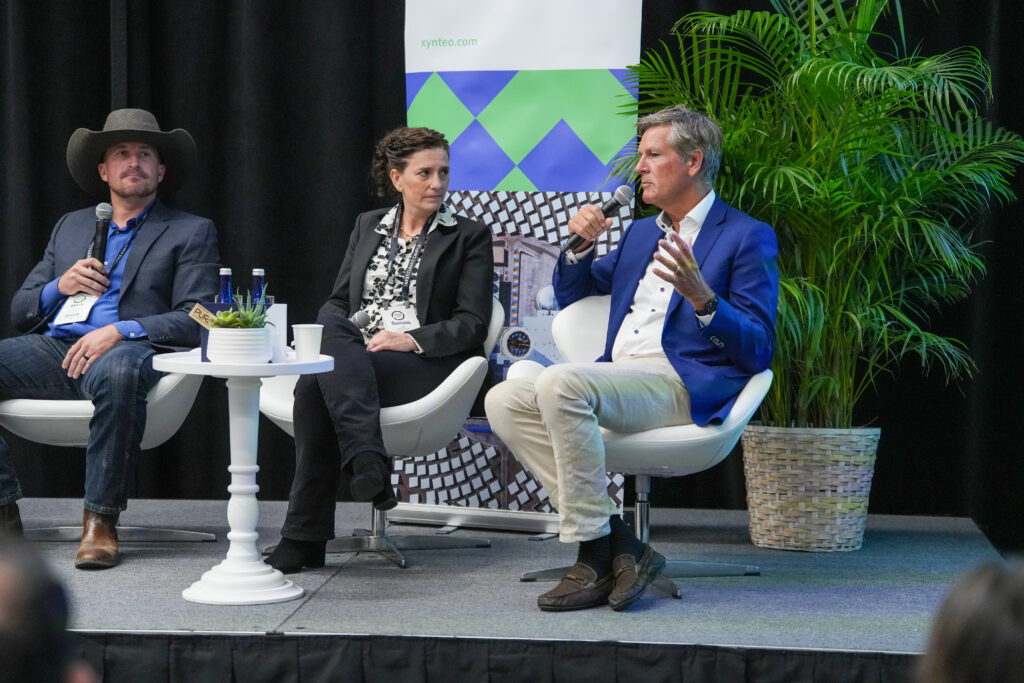
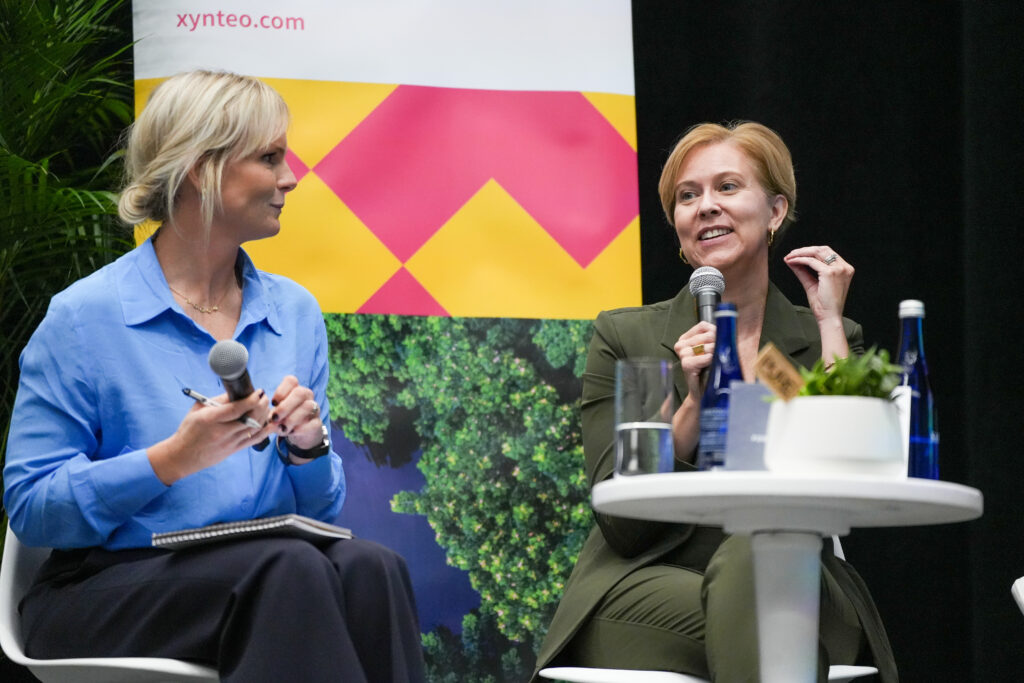
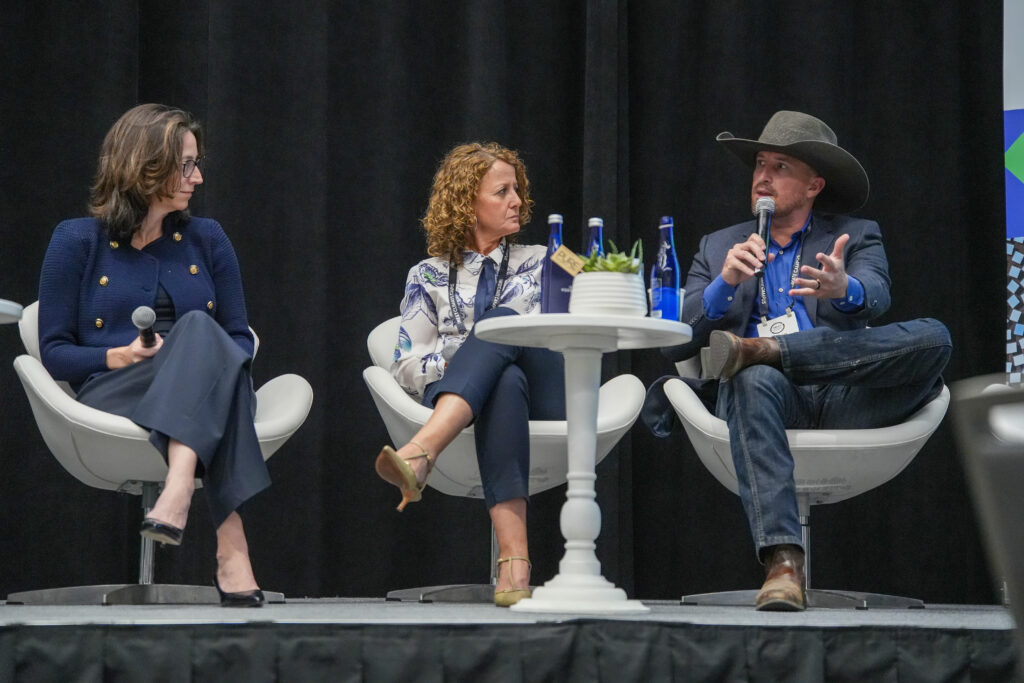
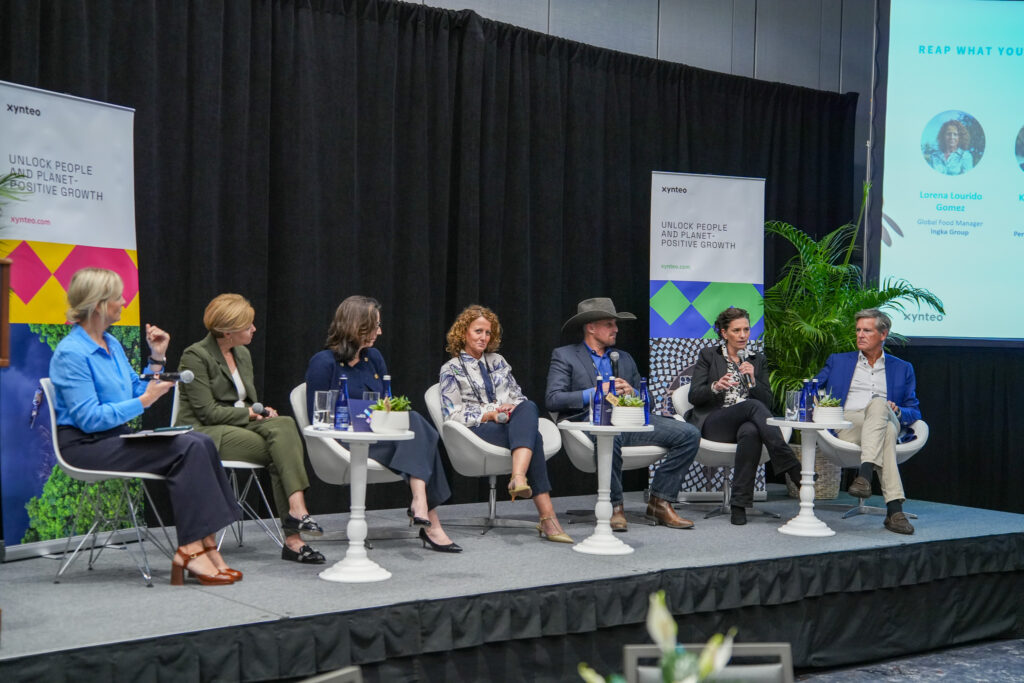

Our panel of experts: Ellie Besley-Gould (Moderator, Xynteo), Lorena Lourido Gomez (Global Food Manager, Ingka), Kevin Muno (Founder and Owner, Perennial Pastures), Barry Parkin (Chief Sustainability Officer, Mars, Incorporated), Sally Smith (Chief Sustainability Officer, Flora Food Group), Daniella Vega (Senior Vice President Health and Sustainability, Ahold Delhaize), Darci Vetter (Senior Vice President and Head of Global Public Policy, PepsiCo).
Evolving consumer choices
Consumer preferences are evolving rapidly, shaped by increasing concerns around environmental impact, personal health, food waste, and animal welfare. This shift has driven a growing interest in plant-based foods, with alternatives to meat and dairy products gaining popularity. However, while many consumers are motivated to make more sustainable choices, navigating the complexity of the food landscape remains a challenge.
While some effective labelling systems exist, there’s an opportunity to make food labels clearer, more accessible, and more consistent across the industry to better support informed consumer decisions. Although transparency is crucial, many current labels can overwhelm consumers with complex information, making it challenging to easily assess the environmental and nutritional impacts of their food choices. Simple, intuitive labelling systems can help guide consumers in aligning their purchasing habits with sustainability goals. Flora Food Group has been at the forefront of this effort, pushing for clearer labelling on plant-based products and advocating for stronger regulatory frameworks that support transparency across the food industry. Their work emphasises the need for policy environments that enable consumers to easily access and understand sustainability data, helping them make more informed decisions.
Industry actions for accessible sustainability
Convenience and affordability are critical factors in promoting sustainable choices. Encouraging consumers to embrace sustainability goes beyond just providing information; it requires practical solutions that seamlessly integrate into their everyday lives. Ahold Delhaize has introduced a positive rewards scheme that incentivises consumers to make healthier and more environmentally friendly choices by offering tangible rewards. This initiative underscores the role businesses can play in promoting sustainable behaviour by making it more attractive and accessible to consumers.
One of the most debated topics during discussions was the balance between plant-based foods and traditional meat and dairy consumption. It’s crucial to recognise that addressing our decarbonisation challenge requires a significant diet shift towards more plants and less meat and dairy. While regenerative farming practices offer promising environmental benefits, addressing the full scope of meat production’s environmental impact requires a broader set of solutions, including dietary changes
To create a truly sustainable food system, industry-wide collaboration and supportive policies are essential. This includes not only efforts from individual companies but also coordinated action across the entire food industry, backed by government policies that incentivise sustainable practices and facilitate the transition to a more plant-based diet.
Tackling food waste
Food waste is an often overlooked yet critical contributor to global greenhouse gas emissions, accounting for up to 10% of the total, with much of this stemming from methane released as food decomposes in landfills. Addressing food waste offers not only environmental benefits but also substantial economic opportunities. Studies suggest that reducing food waste could lower global food-related emissions by up to 8%, while simultaneously saving billions in costs associated with production, logistics, and disposal. This creates a strong incentive for both consumers and businesses to take action.
Part of the solution lies in empowering consumers to manage food more efficiently within their homes, where a significant proportion of food waste occurs. Some companies, like IKEA, are subtly contributing to this effort by designing kitchens that promote better food storage and organisation, helping households reduce waste. These initiatives reflect a broader movement towards integrating sustainability into everyday life, showing that even small shifts in behaviour, supported by practical tools, can have a meaningful impact on reducing food waste.
The way forward
Achieving a net-zero food system requires coordinated efforts from every part of the industry—farmers, producers, processors, retailers, and consumers. Establishing common goals, implementing rigorous standards, and adopting robust monitoring and reporting mechanisms will be essential to track progress and ensure accountability. The role of the consumer is also pivotal. As consumer preferences shift albeit slightly towards sustainability, food retailers have the opportunity to lead by example, setting higher benchmarks for responsible sourcing, waste management, and transparency. Brand trust and evolving expectations will drive this change.
Regulation will play a critical role in enabling this transformation. Policymakers must set clear, enforceable standards for transparency and sustainability across the food supply chain, backed by meaningful penalties for non-compliance. Meanwhile, technological advancements—particularly in data analytics and digital tools—will provide the insights needed to drive efficiencies and innovations that can propel the industry forward.
The path to a sustainable global food system is not without challenges, but the rewards are immense. As we grapple with the dual pressures of feeding a growing global population and combating climate change, what was clear for our discussion at Climate Week NYC is that the food industry is facing into this defining moment with ambition and a bias for positive impact. The question is no longer whether change is necessary or whether the goal is clear, but how quickly we can implement the solutions so we can shape a more sustainable future for generations to come.
You can catch up on all our Climate Week NYC 2024 insights below
Read moreStay up to date with our latest interviews by following us on social media (LinkedIn I Twitter), or Contact Us to find out how we can help your leaders and organisation create people and planet-positive impact.
